IMPLICATURE 语用学 PPT课件
合集下载
语言学conversational-implicaturePPT课件
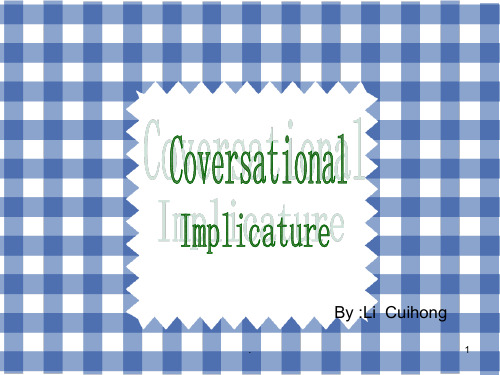
▪ Significance:
▪ one of the foundations of the modern study of pragmatics.
.
4
Categories of Implicature
.
5
Cooperative Principle
▪ Cooperative principle is a very important factor in the process of generating implicature.
.
8
Quality Maxim
▪ Try to make your contribution true: ▪ 1) Do not say what you believe to be false. ▪ 2) Do not say that for which you lack
adequate evidence.
Bob is a genius.
Bob is a mental prodigy.
Bob is an exceptionally clever human being.
Bob is an enormous intellect
Bob is a big brain.
▪ Compare:
Bill didn't manage to save the child.
▪ Honesty is the first policy.
.
9
Relation Maxim
▪ Be relevant(关联的).
▪ 1) A: Mrs. Smith is so disgusting at the party.
B: The curtain is very beautiful.
conversational implicatureppt课件
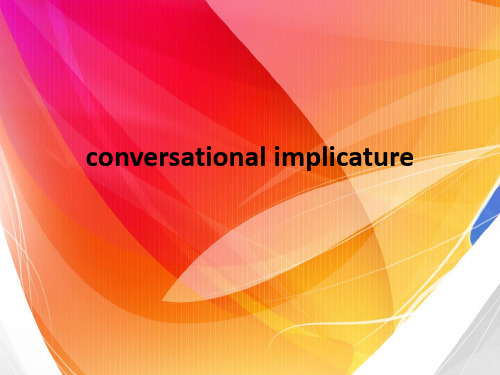
"Good night"
• Father: I think I'll go downstairs to say "good-night" to Nancy's boyfriend. He has been here long enough. • Mother: Now, George, don't you forget how we were when we were young? • Father: That does it! Out he goes!
Common interest in communication
• Lack of common interest will misled communication. • One fammer meets another and says: “Hey, Sam, my horse‘s got distemper(犬瘟热). What did you give yours when it had it?" "Turpentine", grunted Sam. A week later they meet again and the first farmer shouts: “Sam, I gave my horse turpentine(松节油) like you said and it killed him." "So did mine." nodded Sam.
Categories of Implicature
examples for implicature
• 1. She is a new hand here; therefore she turns up on time. (conventional) • 2. John often dines out with a woman. (generalized, conversational) • 3. where is the ice-cream? The kids and their pals had a party here last night. (particularized conversational) • 4. Do you want to wash your hands? (nonconversational, non-conventional)
3GriceanPragmatics---Implicature课件

3.3 Types of implicatures
conventional implicature (规约含义). 规约意义与某些词语(如but、therefore等)的规 约意义密切相关,但对话语的真假值没有影响。 如:Smith is poor, but he is honest. 此句中but所触发的贫穷和诚实的对立就是一种规 约含义。
Contents
3.1 Natural vs. non-natural meaning 3.2 Implicature and implication 3.3 Types of implicatures 3.4 Features of conversational implicatures
3.2 Implicature and implication
Grice pointed out the inadequate attention to the nature and importance of the conditions governing conversation. According to him, “and” means basically the same as “˄” and the additional meaning like “then” as found in the second sentence is an implicature that we infer in consideration of the context.
3.2 Implicature and implication
Implicature and implicatum implicature: implying implicatum: what is implied Implicature covers the meaning of implicatum, used in both singular and plural forms to refer to what is implicated or implied. Implicatum: out of use
IMPLICATURE 语用学
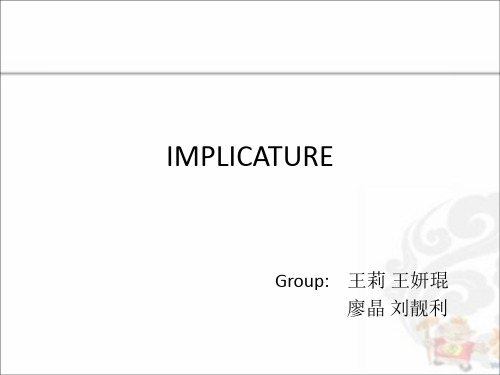
A: Shall we hold the football match tomorrow?
B: It is raining.
Semantic and literal meaning: his answer unrelated to the question. Intended meaning: the football match will be canceled as ground is wet and slippery after the rain.
(c) Carmen: I hear you’ve invite Mat and Chris. Dave : I didn’t invite Mat. (Did Dave invite Chris?) →Dave invited Chris.
The notion of implicature provides some explicit account of how it is possible to mean more than what is actually “said” , or more than what is literally expressed.
a) Tom : Are you going to Mark‟s party tonight? Annie : My parents are in town. (No.) Shared knowledge : Annie‟s relation with her parents b) Tom : Where‟s the salad dressing? Gabriel : We‟ve run out of olive oil. (There isn‟t any salad dressing.) Shared knowledge : Oliver oil is a possible ingredient in salad dressing and they only use salad dressing made from olive oil.
IMPLICATURE 语用学 ppt课件
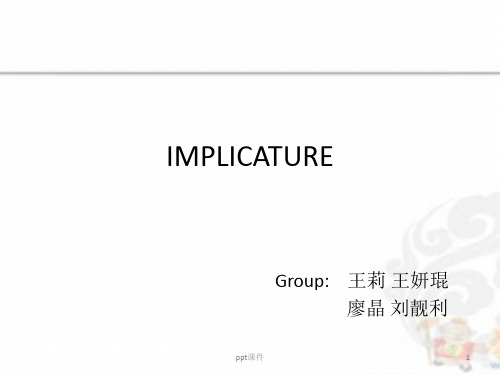
→Dave did not fix the leak.
(c) Carmen: I hear you’ve invite Mat and Chris. Dave : I didn’t invite Mat.
(Did Dave invite Chris?)
→Dave invited Chris.
ppt课件
as ground is wet and slippeprpyt课a件fter the rain.
5
There is a gap between what is literally said and what is implied. So in this case, implicature helps to explain how some seemingly unrelated sentences come to mean the same. With the help of context , the use of implicature makes our language use more colorful. We may express the same meaning in different ways to suit appropriate context.(何自然)
Scale of quantity: some most all Scale of frequency: sometimes often always Scale of coldness: cool cold freezing
ppt课件
8
We normally assume that, where speakers have a scale of values at their disposal, they will chose the one that is truthful and optimally informative. So we normally draw the implicature ‘not any of the higher values on the scale’.
(c) Carmen: I hear you’ve invite Mat and Chris. Dave : I didn’t invite Mat.
(Did Dave invite Chris?)
→Dave invited Chris.
ppt课件
as ground is wet and slippeprpyt课a件fter the rain.
5
There is a gap between what is literally said and what is implied. So in this case, implicature helps to explain how some seemingly unrelated sentences come to mean the same. With the help of context , the use of implicature makes our language use more colorful. We may express the same meaning in different ways to suit appropriate context.(何自然)
Scale of quantity: some most all Scale of frequency: sometimes often always Scale of coldness: cool cold freezing
ppt课件
8
We normally assume that, where speakers have a scale of values at their disposal, they will chose the one that is truthful and optimally informative. So we normally draw the implicature ‘not any of the higher values on the scale’.
语用学ppt..
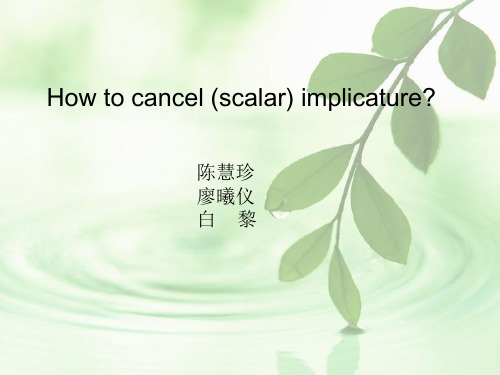
What is implicated
Contextual meaning
指语言在使用时所产生与语境相关的附加意 义。(熊学亮 1997)
熊学亮. 含义分类标准评析.[J]. 外语教学与研 究.1997: 1-8
3)Classification (Grice 1961,1975):
meaning
(4)Not all of the students went to the party. +>Some of the students went to the party. (5)John smiled at the secretary. +>John smiled at the female secretary. (6)James caused the car to stop. +>James caused the car to stop in an abnormal way.
3)S, W涉及的是相同的语义关系或来自相同的语义场。
(转引 项成东 2006 ;Horn 1972)
构成荷恩等级关系的常见等级词:
1)不定代词,如<al,l some>等;
2)数词,如<,three, two, one>等;
3)情态词,如<necessarily,possibly>, <mus,t should, may>等; 4)连接词,如<and, or>等;频度副词,如<always, often, sometimes>等; 5)程度形容词,如<ho,t warm >等; 6)动词,如<know, believe>, <love, like>或<start, finish>等
Contextual meaning
指语言在使用时所产生与语境相关的附加意 义。(熊学亮 1997)
熊学亮. 含义分类标准评析.[J]. 外语教学与研 究.1997: 1-8
3)Classification (Grice 1961,1975):
meaning
(4)Not all of the students went to the party. +>Some of the students went to the party. (5)John smiled at the secretary. +>John smiled at the female secretary. (6)James caused the car to stop. +>James caused the car to stop in an abnormal way.
3)S, W涉及的是相同的语义关系或来自相同的语义场。
(转引 项成东 2006 ;Horn 1972)
构成荷恩等级关系的常见等级词:
1)不定代词,如<al,l some>等;
2)数词,如<,three, two, one>等;
3)情态词,如<necessarily,possibly>, <mus,t should, may>等; 4)连接词,如<and, or>等;频度副词,如<always, often, sometimes>等; 5)程度形容词,如<ho,t warm >等; 6)动词,如<know, believe>, <love, like>或<start, finish>等
语用学The Theory of Conversational Implicature

Conversational Implicatures
• A conversational implicature is an inference from the semantic content depending on context, speaker's intention, hearer's attitude and the mutual['mjuːtʃʊəl] assumption共同假设. • Grice's Theory of Conversational Implicature (1967) is "one of the single most important ideas in pragmatics" (Levinson, 1983)
Cancellability (可撤消性): If the linguistic or situational contexts changes, the implicature will also change. A: Do you want some coffee? B: Coffee would keep me awake. (I do not like coffee.) B: Coffee would keep me awake. I want to stay up.
• 2) The Cooperative Principle
• to explain the mechanisms(['mek(ə)nɪz(ə)m]机制,原理) by which people interpret conversational implicature or to explain why people often mean more than what they say, Grice (1975) proposed the Cooperative Principle and introduced four conversational maxims • The general principle • Both the speaker and the hearer try to be cooperative in the ongoing communicative exchange according to certain purposes. • a rational (合理的;理性的) speaker in normal cases will follow this general principle
语用学课件
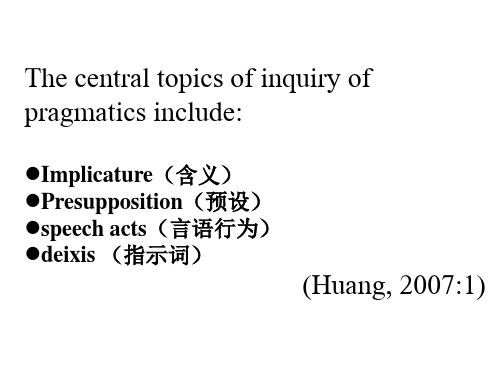
A: Mike has two pencils. (John has only two pencils and no more)
B: Mike has two pencils and perhaps two or more. (By adding “perhaps two or more”, the implicature disappears)
假设大家都知道John is an idiot.,但偏要嘲笑说John is a genius,即使不说这句话,改说下面任何一种同义结构:
()John is a mental prodigy. () John is an exceptionally clever human being. () John is an enormous intellect. () John is a big brain.
B: It is raining.
Semantic and literal meaning: his answer unrelated to the
question.
B’s implicature: the football match will be canceled as the
ground is wet and slippery after the rain.
预设分类(依据预设内容)
存在预设:用于陈述某人某事有一定性质的话语。 一般都预设讨论对象的存在。
话语的字面意义或语义组合。 听话人:根据相关语境因素进行推理,获取字面意
义以外的交际信息
在言语交际中,类似的字面意义或语义意义以外的隐含 信息就是我们要讨论的会话中的含义,即会话含义。
合作原则的内涵 格赖斯(Grice ,1975)认为:
B: Mike has two pencils and perhaps two or more. (By adding “perhaps two or more”, the implicature disappears)
假设大家都知道John is an idiot.,但偏要嘲笑说John is a genius,即使不说这句话,改说下面任何一种同义结构:
()John is a mental prodigy. () John is an exceptionally clever human being. () John is an enormous intellect. () John is a big brain.
B: It is raining.
Semantic and literal meaning: his answer unrelated to the
question.
B’s implicature: the football match will be canceled as the
ground is wet and slippery after the rain.
预设分类(依据预设内容)
存在预设:用于陈述某人某事有一定性质的话语。 一般都预设讨论对象的存在。
话语的字面意义或语义组合。 听话人:根据相关语境因素进行推理,获取字面意
义以外的交际信息
在言语交际中,类似的字面意义或语义意义以外的隐含 信息就是我们要讨论的会话中的含义,即会话含义。
合作原则的内涵 格赖斯(Grice ,1975)认为:
IMPLICATURE 语用学ppt课件
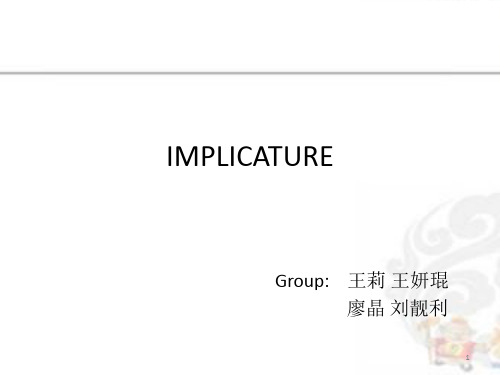
IMPLICATURE
Group: 王莉 王妍琨 廖晶 刘靓利
1
1.Definition of implicature 2.Generalized implicature 3.Particularized implicature 4.How to distinguish implicature and presupposition
A: Shall we hold the football match tomorrow?
B: It is raining.
Semantic and literal meaning: his answer unrelated to the question.
Intended meaning: the football match will be canceled
Scale of quantity: some most all Scale of frequency: sometimes often always Scale of coldness: cool cold freezing
8
We normally assume that, where speakers have a scale of values at their disposal, they will chose the one that is truthful and optimally informative. So we normally draw the implicature ‘not any of the higher values on the scale’.
6
If you were Jane, what implicatures would you have drawn from each of Steve’s responses?
Group: 王莉 王妍琨 廖晶 刘靓利
1
1.Definition of implicature 2.Generalized implicature 3.Particularized implicature 4.How to distinguish implicature and presupposition
A: Shall we hold the football match tomorrow?
B: It is raining.
Semantic and literal meaning: his answer unrelated to the question.
Intended meaning: the football match will be canceled
Scale of quantity: some most all Scale of frequency: sometimes often always Scale of coldness: cool cold freezing
8
We normally assume that, where speakers have a scale of values at their disposal, they will chose the one that is truthful and optimally informative. So we normally draw the implicature ‘not any of the higher values on the scale’.
6
If you were Jane, what implicatures would you have drawn from each of Steve’s responses?
IMPLICATURE 语用学PPT课件
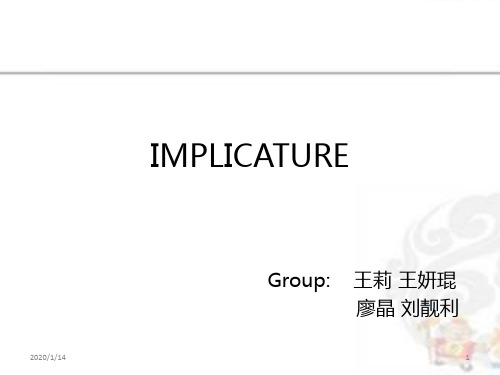
mean the same. With the help of context ,
the use of implicature makes our language
use more colorful. We may express the
same meaning in different ways to suit
→CDhraivs?e)invited Chris.
2020/1/14
4
The notion of implicature provides some explicit account of how it is possible to mean more than what is actually “said” , or more than what is literally expressed.
2020/1/14
3
(a)Carmen: Did you get the milk and the eggs? Dave: I got the milk.
(Did Dave buy the eggs?) →Dave did not buy the eggs.
(b)Carmen: Did you manage to fix that
IMPLICATURE
2020/1/14
Group: 王莉 王妍琨 廖晶 刘靓利
1
1.Definition of implicature
2.Generalized implicature
3.Particularized implicature
4.How to distinguish implicature and presupposition
A: Shall we hold the football match tomorrow?
语用学-5--Conversational-implicaturePPT课件

10
-
1.2 Defining implicatures
What is intended by the speaker, or the intended
speaker meaning.
Invisible meaning or implicit meaning.
Additional conveyed meaning that is more than
importance of the conditions governing conversation Implicature
2
-
What is said what is implied— Conventional implicature Non-conventional implicature General principle of discourse CP Rational cooperative Submaxims (Kant) Aesthtic, social, moral See talking as a special case of purposive
In what context does this dialogue occur?
Please explain the meaning that B intends to convey.
5
-
How is it possible for the speaker and the hearer to understand each other?
16
-
E.g. It is cold in here. Setting: in a classroom Speaker: teacher hearer: student Analysis: from Searle? Grice? The speaker X intends to make a request of the
implicature

格赖斯的意义理论发端于1957年的Meaning一文,丰 满成形于1967年在哈佛大学作的系列讲座, 1989年出版的 Studies in the Way of Words一书是这一思想的总结, 其基本 内容可以概括为以下几点。 1. 自然意义和非自然意义 格赖斯分析语言的意义从明辨自然意义(Natural meaning)和非自然意义(non natural meaning)开始。两者的 区别可用下例说明。 ①The number of concentric rings means that the tree lived so many years. ②Those three rings on the bell(of the bus)meant that the bus is full.
Assume that sentence (a) in each pair is synthetically true. Then look at sentence (b) and decide if you can assume that it is automatically true given the truth of (a). 1. (a) Annie is thin. (b) Annie is not fat. 2. (a) Annie baked a cake. (b) Annie baked something.
Similarly, given that you can easily answer “false” to (e) and (f). The meaning of mother and boy and tiger and reptile make such sentences necessarily false, or C O N T R A D I C T I O N S .
语言学-5Con-Implicature-Ippt课件

——科技在进步,新的药物在研制,希望总是有的。
(quality) 13. —— Where is Mary?
—— She’s not well. (relation) 14. —— Is he brave?
—— He’s a lion. (manner)
.
特殊会话含意
人们应该遵守合作原则——他现在蔑视或违反合 作原则——他是在故意蔑视或违反合作原则—— 他其实是在另一个层次上参与合作——更高的合 作层次产生“含意”。
.
合作原则的准则/次则(内容)
合作原则
Co-operative Principle
量准则
质准则
关系准则
方式准则
The Maxim of Quantity The Maxim of Quality The Maxim of Relation The Maxim of Manner
.
量准则
Make your contribution as informative as is required (for the current purposes of the exchange). 说话要足量。 Do not make your contribution more informative than is required. 但也别多说。
( hard-working, indifferent, precise about what he does etc.)
.
规约含意:语义层面的含意
个别词语和表达是否具有“含意”的属性?肯定的回答引 申出规约含意(conventional implicature)的概念。特点为: 不可消除 可分离(与词语有约定俗成的联系) 不可推导(不需合作原则的帮助进行推导) 22. She is poor but honest. (“对照”意不可消除)
(quality) 13. —— Where is Mary?
—— She’s not well. (relation) 14. —— Is he brave?
—— He’s a lion. (manner)
.
特殊会话含意
人们应该遵守合作原则——他现在蔑视或违反合 作原则——他是在故意蔑视或违反合作原则—— 他其实是在另一个层次上参与合作——更高的合 作层次产生“含意”。
.
合作原则的准则/次则(内容)
合作原则
Co-operative Principle
量准则
质准则
关系准则
方式准则
The Maxim of Quantity The Maxim of Quality The Maxim of Relation The Maxim of Manner
.
量准则
Make your contribution as informative as is required (for the current purposes of the exchange). 说话要足量。 Do not make your contribution more informative than is required. 但也别多说。
( hard-working, indifferent, precise about what he does etc.)
.
规约含意:语义层面的含意
个别词语和表达是否具有“含意”的属性?肯定的回答引 申出规约含意(conventional implicature)的概念。特点为: 不可消除 可分离(与词语有约定俗成的联系) 不可推导(不需合作原则的帮助进行推导) 22. She is poor but honest. (“对照”意不可消除)
- 1、下载文档前请自行甄别文档内容的完整性,平台不提供额外的编辑、内容补充、找答案等附加服务。
- 2、"仅部分预览"的文档,不可在线预览部分如存在完整性等问题,可反馈申请退款(可完整预览的文档不适用该条件!)。
- 3、如文档侵犯您的权益,请联系客服反馈,我们会尽快为您处理(人工客服工作时间:9:00-18:30)。
Scalar implicatures are a special type of generalized implicature where the inference is made by reference to a scale of values, one of which has been chosen by the speaker. The speaker’s choice implicates ‘not the higher values’.
If you were Jane, what implicatures would you have drawn from each of Steve’s responses?
a. Jane: Who used all the printer paper? Steve: I used some of it.
There is a gap between what is literally said and what is implied. So in this case, implicature helps to explain how some seemingly unrelated sentences come to mean the same. With the help of context , the use of implicature makes our language use more colorful. We may express the same meaning in different ways to suit appropriate context.(何自然)
Shared knowledge : Someone might overhear Jane’s answer.
d) Mat : Want some fudge brownies? Chris : There must be 20000 calories there. (No.)
Shared knowledge : Food with a high number of calories makes people put on
IMPLICATURE
Group: 王莉 王妍琨 廖晶 刘靓利
1.Definition of implicature 2.Generalized implicature 3.Particularized implicature 4.How to distinguish implicature anCarmen: Did you get the milk and the eggs? Dave: I got the milk.
(Did Dave buy the eggs?) →Dave did not buy the eggs.
(b)Carmen: Did you manage to fix that leak? Dave : I tried to. (Did Dave fix the leak?) →Dave did not fix the leak.
There is a test that is sometimes uesd to distinguish presuppositions from implicatures.
• Cancellation test
Here are four dialogues where Annie has 'cancell' either a presupposition contained in her utterence(the cancellation come after the 'dash'). Do you notice a difference between presuppositions and implicatures when they are cancelled?
Generalized conversational implicature: The implicatures that they are so strong that they do not seem to require any extra knowledge to extract the meaning.
(c) Carmen: I hear you’ve invite Mat and Chris. Dave : I didn’t invite Mat. (Did Dave invite Chris?) →Dave invited Chris.
The notion of implicature provides some explicit account of how it is possible to mean more than what is actually “said” , or more than what is literally expressed.
Shared knowledge : Oliver oil is a possible ingredient in salad dressing and they only
use salad dressing made from olive oil.
c) Steve : What’s with your mother? Jane : Let’s go into the garden. (I can’t talk about it here.)
These responses are true in technically. However, from a pragmatic point of view, Steve’s utterances have certainly misled Jane because of the implicatures that people normally draw in these circumstances. Steve’s trickery involved what we call Scalar implicatures. All of Steve’s responses use words that participate in a scale of values:
Inferences which require this kind of shared knowledge between the speaker and the hearer are sometimes called particularized conversational implicatures.
b. Jane: I hear you’re always late with the rent. Steve: Well, sometimes I am.
Implicatures:
a. Steve did not use all of the printer paper, only some of it. b. Steve is not always late with the rent, only sometimes.
Implicature is a technical term in the pragmatics subfield of linguistics, coined by H.P.Grice, which refers to what is suggested in an utterance, even though neither expressed nor strictly implied by the utterance.
Scale of quantity: some most all Scale of frequency: sometimes often always Scale of coldness: cool cold freezing
We normally assume that, where speakers have a scale of values at their disposal, they will chose the one that is truthful and optimally informative. So we normally draw the implicature ‘not any of the higher values on the scale’.
Generalized implicatures can be drawn with very little ‘inside’ knowledge. If you heard a tape recording of the conversation but knew noting about the participants or the physical characteristics of the context, you could still draw those implicatures. They are closely connected to the degree of informativeness that we normally expect a speaker’s utterance to provide.
a) Tom : Are you going to Mark’s party tonight? Annie : My parents are in town. (No.)
Shared knowledge : Annie’s relation with her parents
b) Tom : Where’s the salad dressing? Gabriel : We’ve run out of olive oil. (There isn’t any salad dressing.)
A: Shall we hold the football match tomorrow?
If you were Jane, what implicatures would you have drawn from each of Steve’s responses?
a. Jane: Who used all the printer paper? Steve: I used some of it.
There is a gap between what is literally said and what is implied. So in this case, implicature helps to explain how some seemingly unrelated sentences come to mean the same. With the help of context , the use of implicature makes our language use more colorful. We may express the same meaning in different ways to suit appropriate context.(何自然)
Shared knowledge : Someone might overhear Jane’s answer.
d) Mat : Want some fudge brownies? Chris : There must be 20000 calories there. (No.)
Shared knowledge : Food with a high number of calories makes people put on
IMPLICATURE
Group: 王莉 王妍琨 廖晶 刘靓利
1.Definition of implicature 2.Generalized implicature 3.Particularized implicature 4.How to distinguish implicature anCarmen: Did you get the milk and the eggs? Dave: I got the milk.
(Did Dave buy the eggs?) →Dave did not buy the eggs.
(b)Carmen: Did you manage to fix that leak? Dave : I tried to. (Did Dave fix the leak?) →Dave did not fix the leak.
There is a test that is sometimes uesd to distinguish presuppositions from implicatures.
• Cancellation test
Here are four dialogues where Annie has 'cancell' either a presupposition contained in her utterence(the cancellation come after the 'dash'). Do you notice a difference between presuppositions and implicatures when they are cancelled?
Generalized conversational implicature: The implicatures that they are so strong that they do not seem to require any extra knowledge to extract the meaning.
(c) Carmen: I hear you’ve invite Mat and Chris. Dave : I didn’t invite Mat. (Did Dave invite Chris?) →Dave invited Chris.
The notion of implicature provides some explicit account of how it is possible to mean more than what is actually “said” , or more than what is literally expressed.
Shared knowledge : Oliver oil is a possible ingredient in salad dressing and they only
use salad dressing made from olive oil.
c) Steve : What’s with your mother? Jane : Let’s go into the garden. (I can’t talk about it here.)
These responses are true in technically. However, from a pragmatic point of view, Steve’s utterances have certainly misled Jane because of the implicatures that people normally draw in these circumstances. Steve’s trickery involved what we call Scalar implicatures. All of Steve’s responses use words that participate in a scale of values:
Inferences which require this kind of shared knowledge between the speaker and the hearer are sometimes called particularized conversational implicatures.
b. Jane: I hear you’re always late with the rent. Steve: Well, sometimes I am.
Implicatures:
a. Steve did not use all of the printer paper, only some of it. b. Steve is not always late with the rent, only sometimes.
Implicature is a technical term in the pragmatics subfield of linguistics, coined by H.P.Grice, which refers to what is suggested in an utterance, even though neither expressed nor strictly implied by the utterance.
Scale of quantity: some most all Scale of frequency: sometimes often always Scale of coldness: cool cold freezing
We normally assume that, where speakers have a scale of values at their disposal, they will chose the one that is truthful and optimally informative. So we normally draw the implicature ‘not any of the higher values on the scale’.
Generalized implicatures can be drawn with very little ‘inside’ knowledge. If you heard a tape recording of the conversation but knew noting about the participants or the physical characteristics of the context, you could still draw those implicatures. They are closely connected to the degree of informativeness that we normally expect a speaker’s utterance to provide.
a) Tom : Are you going to Mark’s party tonight? Annie : My parents are in town. (No.)
Shared knowledge : Annie’s relation with her parents
b) Tom : Where’s the salad dressing? Gabriel : We’ve run out of olive oil. (There isn’t any salad dressing.)
A: Shall we hold the football match tomorrow?
